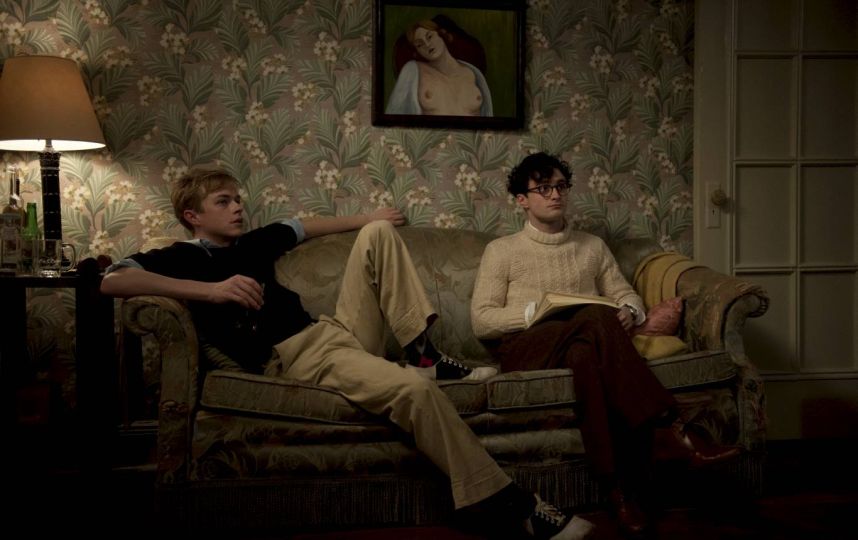Kill Your Darlings
Director: John Krokidas
Cast: Daniel Radcliffe, Dan DeHaan, Jack Huston
Length: 104 minutes
Country: USA
Kill Your Darlings, the directorial debut from John Krokidas follows a young Allen Ginsberg (Daniel Radcliffe), pre-Howl, during his time in Columbia University and details his involvement in a murder committed by colleague, Lucien Carr (Dane DeHaan). The film sets itself up for failure as soon as it becomes apparent there are two films competing, each fighting to achieve their full potential and consequently, hindering both. Part of the film’s failure could be attributed to the nature of entertainment. People enjoy reading and writing, not watching people read and write. And the finished work is usually more interesting than the story behind it. Krokidas tries to prove us wrong here, but the overwritten, overacted, homosexual romance killing we are finally delivered is frustratingly aimless melodrama at best.
Many people watching this film will have their eyes firmly fixated on the performance of Daniel Radcliffe. Harry Potter comes of age, takes drugs and has gay sex. Following a respectable but by no means stretching turn as a haunted widower in The Woman in Black last year, the graduated ‘boy wizard’ finally finds a meatier, more exciting and daring role, managing to create a believable Ginsberg amongst the numerous other interpretations whilst holding a solid accent and being above all other things, damn entertaining. In this respect, the casting of Radcliffe is genius; as an audience we have seen him mature since his first appearance 13 years ago and by casting him in the role of a restrained writer who discovers newfound freedom and liberation, parallels can be drawn between the two roles of Radcliffe’s public persona and his portrayal of Ginsberg on screen. Opposite Radcliffe, is Dane DeHaan, an actor who caught my attention in Lawless, captivated me in The Place Beyond the Pines and has now disappointed me in his portrayal of Lucien Carr. One gets the feeling the viewer should revel in the rebellious nature of Carr, getting caught up in his enthusiasm and the whirlwind of new poetry during the first half of the film; unfortunately, whenever DeHaan graces the screen, all we have is a self-righteous, unlikeable manipulator.
It says a lot about a film when the most interesting part is the brief description written at the end preceding the credits…
The early scenes which feature Ginsberg, Kerouac, Burroughs and Carr (think Avengers Assemble for the beat generation) literally destroying the old poetic form to make way for their new vision are genuinely exciting, possessing a slick editing technique and powerful use of montage. One can only wish this was the film we could continue to watch before the narrative jumps headfirst into the other competing story of Lucien and his relationship with an older teacher. The subject of homosexuality in this era and the consequences it can have is handled commendably but is regrettably the only interesting aspect of the latter half of the picture. Here, the screenplay wallows in its own self importance, much like many of the characters, and for such a shallow film, it has drowned itself by the final act as a result of this overconfidence, leaving the viewer feeling empty and hollow.
It says a lot about a film when the most interesting part is the brief description written at the end preceding the credits, detailing the future successes of the Beat writers. Kill Your Darlings could have been a number of different films but unfortunately it evolved into one of the dullest possible. Radcliffe delivers a decent and rather delightful performance which proves he isn’t harmed by this picture in the slightest and will continue with a prosperous post-Potter career. Other supporting roles, namely that of Jack Huston as a young Jack Kerouac deserve a mention. Though under-used, worthy evidence is provided of Huston making a name for himself on the big screen following a solid turn in Oscar favourite American Hustle after having been the best thing about HBO’s Boardwalk Empire from its second season onwards.
As the credits roll and the lights come up to the slick guitar of ‘Don’t Look Back Into The Sun’ by The Libertines, it becomes apparent that this wasted opportunity is shallow Ginsberg for modern day hipsters, blinded by its notions of importance and love for itself and ultimately, doing the material that evolved out of the period a giant disservice.

Comments